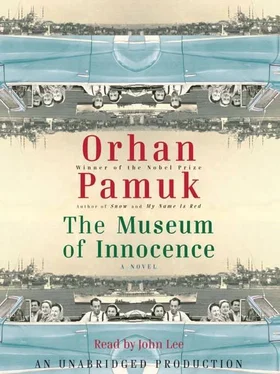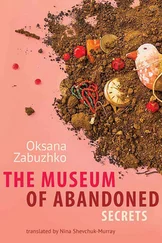The pleasures of sitting beside Füsun, the fleeting happiness of being at one with the audience as I watched the film, if chilled by a wind of jealousy, could produce a darkness benighting everything under the sun. But on some transcendent occasions the whole world seemed illumined: When, for instance, amid the misery of heroes forever losing their sight, my arm would brush against the velvet skin of her arm, and, not wishing the wondrous sensation to end, I would hold my arm still, continuing to watch the film without following the action, until I could believe that she had actually let her arm brush against me, I would almost faint from happiness. At the end of the summer, in the Arnavutköy Çampark Cinema, while watching Little Lady , about a spoiled rich girl’s adventures with the chauffeur who brings her to her senses, our arms brushed against each other that way, and remained intensely in contact as the fire of her skin ignited mine, and until my body reacted with an entirely unexpected elation. So transported was I by the dizzying sensation that for a time I paid no attention to arresting my body’s impudence, and so when the lights came on, and the five-minute intermission began, I was obliged to hide my shame by draping my navy pullover over my lap.
“Shall we get some soda?” said Füsun. At the interval she usually went with her husband to buy soda and pumpkin seeds.
“Sure, but give me a moment, would you?” I said. “I just had a thought I’m trying to remember.”
Just as I had done as a lycée student, whenever I needed to hide my body’s importune excitement from my classmates, I raced through memories of my grandmother’s death, the real and imaginary funeral rites of my childhood, the times when my father had scolded me, and then I imagined my own funeral, the grave terrifyingly dark, my eyes filled with earth. Half a minute later I was ready to stand up without betraying myself.
Walking together toward the soda vendor, I noticed as if for the first time how tall she was and how fine her posture. How pleasant it was to walk among families, chairs, running children without worry of being seen… I liked to observe the notice she attracted in the crowd, and it made me so happy to imagine that they saw us as a couple, husband and wife. That this short walk together was worth all the pain I had suffered, that I was living through a moment unlike any other, that this walk was one of the happiest moments in my life, seemed certain even as it was happening.
As always, there was no queue for the soda vendor, only a crowd of children and adults all shouting at once. So we took our place behind them and began to wait.
“So what was this serious thought you were trying to remember just now?” Füsun asked.
“I liked the film,” I said. “I was wondering how it was I could now enjoy all these films that I used to laugh at in the old days, or just ignore. At that moment it seemed to me the answer was on the tip of my tongue if I could only concentrate.”
“Do you really like these films? Or do you like coming with us to see them?”
“Of course I like them. They make me so very happy. Most of the ones we’ve seen this summer, they speak to a sorrow inside me, and I find them consoling.”
“But life is not as simple as these films, actually,” said Füsun, as if disturbed to see me so fanciful. “But I am enjoying myself. I’m glad you’ve come with us.”
For a moment we were silent. What I wanted to say was, It is enough for me to sit beside you. Had it been by chance that our arms had stayed pressed together for so long? How excruciating it was, longing to express these hidden thoughts, knowing that the crowds at the cinema like the whole world in which we lived would not allow it. Through the loudspeakers hanging from the trees we heard Orhan Gencebay’s song from the film we’d seen two months ago in the hills of Pendik, overlooking the Sea of Marmara. “Once you were my sweetheart…” It summoned all my memories of the summer, now passing before my eyes like a picture show, those sublime moments of sitting in Bosphorus restaurants drunkenly admiring Füsun and the moon on the sea.
“I’ve been very happy this summer,” I said. “These films have taught me how. The important thing in life is not to be rich… What a pity it is… all this agony… this suffering… Don’t you think?”
“A film about life and agony,” said my beauty, as her face clouded, “should be sincere.”
When one of the children squirting soda at one another came hurtling toward her, I took Füsun by the waist and pulled her toward me. A bit of the soda had splashed on her.
“You sons of donkeys!” said one old man as he slapped one of them on the neck. He looked to us for approval, and his eyes fell on my hand, still on Füsun’s waist.
How close we were to each other in that cinema garden, not just physically but spiritually! Füsun, fearful of the way I was looking at her, backed away, walking through the crowd of brats to reach for the soda bottles sitting arranged in the laundry basin; she had already broken my heart.
“Let’s buy one for Çetin Efendi, too,” said Füsun. She had two bottles opened.
I paid for the sodas and then I took one over to Çetin Efendi, who would never join us in the “family section” when we went to films, but sat alone in the section for single men.
“You shouldn’t have, Kemal Bey,” he said with a smile.
When I turned around I saw a child staring in awe as Füsun drank straight from her soda bottle. The child was bold enough to approach us.
“Are you an actress, sister?”
“No.”
Because the fashion has now passed, let me remind my readers that in those days this question was a way of telling girls they were pretty, and served as a popular pickup line for playboys wishing to approach well-groomed girls in outfits slightly more revealing than the norm, and who were not exactly upper-class. But this child, who looked to be about ten years old, had no such motives. He insisted: “But I’ve seen you in a film.”
“Which one?” asked Füsun.
“Autumn Butterflies , and you were wearing the same dress, you know…”
“What part was I playing?” Füsun asked, smiling with pleasure at this child’s fantasy.
But the child, now realizing his mistake, fell silent.
“Let me ask my husband now,” she said to spare the little boy’s feelings. “He knows all these films.”
You will have understood that when Füsun said “husband,” and looked across the chairs to pick him out in the crowd, and the child realized I was not the man in question, I felt wounded. But spurred on by the joy of being so close to her, drinking soda with her, I said this: “The child must have sensed that we’ll be making a film soon that will make you a star.”
“So you’re saying that you really are going to shell out the money to make this film? Please don’t take offense, Cousin Kemal, but Feridun is too embarrassed even to bring up the subject, but let me tell you, we’re sick and tired of waiting.”
“Is that so?” I said. I was dumbstruck.
53 An Indignant and Broken Heart Is of No Use to Anyone
I DID not say another word all night. Because so many languages describe the condition I was in as “heartbreak,” let the broken porcelain heart I display here suffice to convey my plight at that moment to all who visit my museum. The pain of love no longer manifested itself as panic, hopelessness, or anger, as it had done the previous summer. By now it had become a more viscous substance that coursed through my veins. Because I had been seeing Füsun every other day if not every day, the heartache of absence had lessened, and I had developed new habits to cope with the new milder pain of her presence; after a summer of careful practice these habits had become second nature, making me a new man. I no longer spent my days battling with my pain; instead I could suppress it, veil it, or act as if there were nothing wrong with me.
Читать дальше












